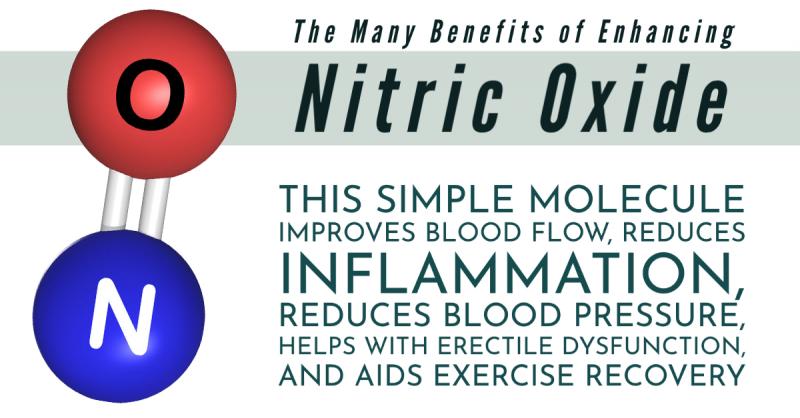
Nitric oxide (NO) is a simple molecule composed of one atom of nitrogen and one atom of oxygen. It is highly reactive and only lasts a few seconds in the body after it is created, but it plays a critical role in overall health because of its ability to enhance blood flow.
In 1998, the Nobel Peace Prize for Physiology or Medicine was awarded to three researchers for their discoveries concerning nitric oxide as a signaling molecule in the cardiovascular system. These researchers found that the cells lining the blood vessels produce NO to relax the muscles in the blood vessels, thereby reducing blood pressure and allowing greater blood flow.
The research into NO explains why nitroglycerine works as a treatment for angina (chest pain from narrowed arteries). Nitroglycerine is transformed into nitrite, which is then converted to NO, causing an immediate relaxing of blood vessels.
Since that time, researchers have found numerous health benefits from enhancing NO production in the body, starting with its ability to greatly enhance cardiovascular health. In fact, NO may be a critical factor in helping to reduce cardiovascular disease in general.
Nitric Oxide and Cardiovascular Health
Millions of people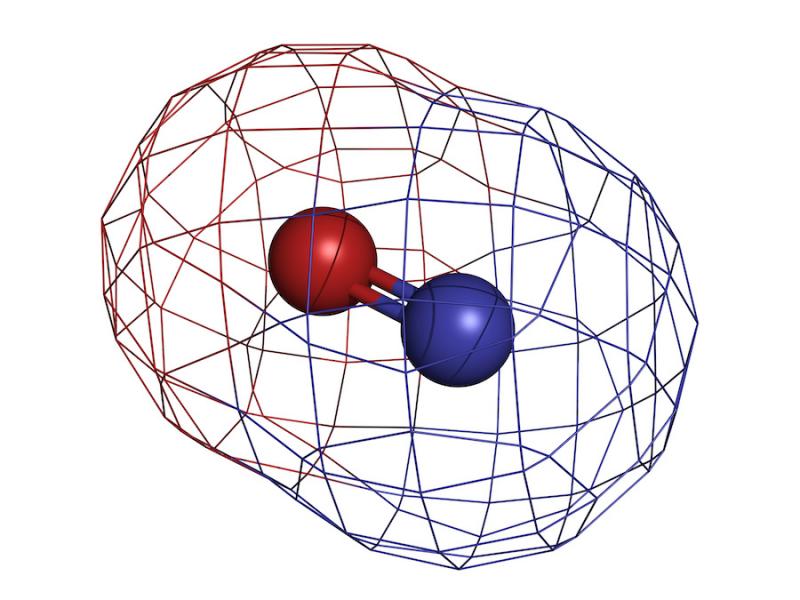 are plagued by high blood pressure from unknown causes (essential hypertension) which is a major risk factor for strokes and heart attacks. High blood pressure also causes kidney damage. But, increasing NO levels appears to be a major way of getting blood pressure back into normal ranges.
are plagued by high blood pressure from unknown causes (essential hypertension) which is a major risk factor for strokes and heart attacks. High blood pressure also causes kidney damage. But, increasing NO levels appears to be a major way of getting blood pressure back into normal ranges.
The research suggests that increasing NO levels can help prevent, slow or even reverse arterial plaque, thereby helping to keep arteries healthy and flexible. It can also help prevent thrombosis, the formation of blood clots in the circulatory system that cause heart attacks, strokes, and other problems.
Reduced blood flow from a lack of NO is also one of the causes of erectile dysfunction (ED). In fact, many drugs for ED work by increasing NO levels.
Another benefit of NO is that increased levels can improve athletic performance by helping more blood (and oxygen) get to the muscles. Adequate levels of NO will help reduce muscle soreness after exercise.
More Health Benefits of Nitric Oxide
The benefits of NO don’t stop with aiding circulation. Increased NO levels have also been shown to increase cellular sensitivity to insulin, making it helpful for people with diabetes. It also reduces diabetic complications such as blindness, foot and leg ulcers, and kidney disease.
There is also a link between NO and chronic inflammation. While the mechanisms involved in this link are still being explored, it appears that chronic inflammation reduces NO production, whereas enhancing NO production is linked with reduced inflammation. What the research shows is that enhancing NO production may help relieve the chronic inflammation involved in asthma and arthritis.
Finally, it appears that NO plays a critical role in the brain. Low levels are associated with memory loss and depression. There is also evidence that higher levels of NO can improve bone density and aid the immune system in fighting infections.
All of this may be linked to the simple fact that nothing in the body can be healthy or heal without an adequate supply of blood. Anything that interferes with how well the blood can supply oxygen and nutrients to the tissues is ultimately going to lead to health problems.
Endothelial Dysfunction and Low NO
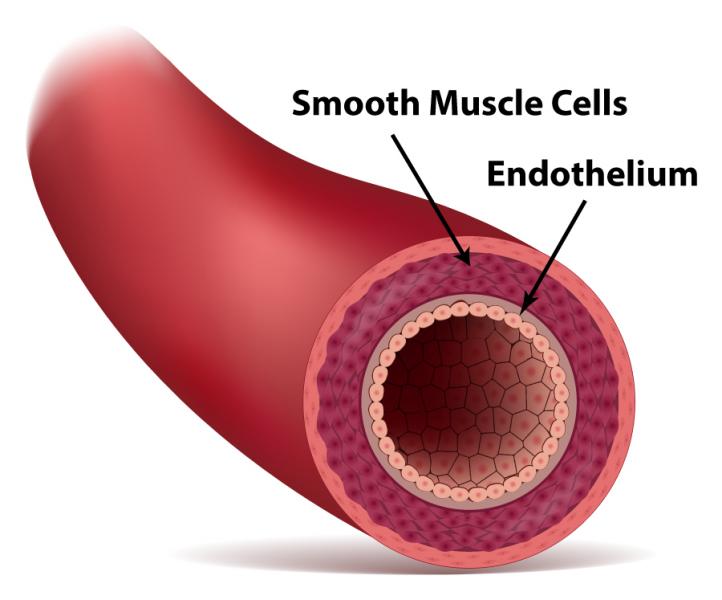 The endothelium or endothelial lining is a layer of cells, just one cell thick, lining the arteries. Because these cells produce nitric oxide to signal the artery muscles to relax and increase blood flow they play a vital role in managing oxygen and nutrient distribution to every other cell of the body.
The endothelium or endothelial lining is a layer of cells, just one cell thick, lining the arteries. Because these cells produce nitric oxide to signal the artery muscles to relax and increase blood flow they play a vital role in managing oxygen and nutrient distribution to every other cell of the body.
Endothelial dysfunction occurs when the endothelial lining is damaged. This means that less nitric oxide will be released, resulting in less blood flow to the tissues. This is an underlying factor in chronic and degenerative disease because tissue health cannot be maintained without adequate blood flow.
Chronic inflammation, one of the major underlying factors in chronic and degenerative disease, contributes to low levels of NO and endothelial dysfunction. The more inflammation present in the body, the lower the levels of NO produced by the endothelium. Thus, all the factors that contribute to chronic inflammation are also involved.
Another major factor is mitochondrial dysfunction. Mitochondria are tiny cellular structures involved in energy production and many other body processes. They produce electrical energy or heat depending on the needs of the body. They also produce heme to produce hemoglobin and nitric oxide, both of which help deliver oxygen to the tissues. Mitochondria can also produce free radicals, which can be involved in tissue damage and chronic inflammation.
Understanding all the different ways NO production is linked with inflammation, energy production and overall health is still being explored by researchers. However, we do know a lot about how you can improve your NO production and overall health. What follows are a few simple ways to do so.
Exercising to Enhance NO
Exercising is one of the best ways to enhance NO production. Thirty to sixty minutes a day of walking, swimming, riding a bike, lifting some weights, or engaging in any other form of moderate exercise greatly increases NO levels, which helps reverse endothelial dysfunction and improve blood flow throughout the body.
Exercise helps prevent cardiovascular disease, reduces your risk of stroke, helps low blood pressure, balances blood fats and triglycerides, reduces inflammation, eases leg pain, and helps you lose weight. It doesn’t matter how old you are, as soon as you start a program of regular physical activity you start to see the benefits within a few weeks.
NO Helps You Say Yes to Exercise
If you struggle to exercise, you’re in luck. The relationship between exercise and NO levels is reciprocal. That is to say, not only does exercise enhance NO, NO enhances the ability to exercise. Several studies have shown that increasing blood levels of nitrates, a precursor to NO production, results in greater efficiency in energy production and oxygen utilization in the muscles during exercise. The research was done using beet juice to supply the nitrates, which enhance NO levels.
This means that enhancing NO can help you exercise longer and with less fatigue and get even more dramatic results than those seen with exercise alone. This is particularly important to know if you are overweight, asthmatic, diabetic, already have heart disease or any other condition that makes exercise difficult. By enhancing NO, you can jump-start your exercise program.
Increasing NO Production with Nutrition
While exercising is critical to healthy NO production, supplementation can spark the energy to get started while both enhancing the production of NO and the health of the endothelial lining. We’ll start by looking at the two pathways in the body for creating NO and the nutrients that support them.
L-Arginine and NO
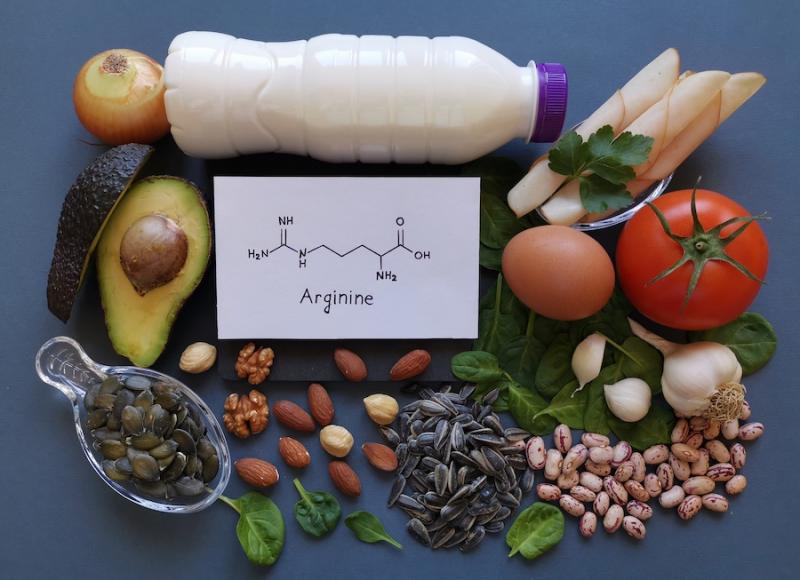 The first NO pathway involves nitric oxide synthase (NOS) enzymes, which produce NO from the amino acid l-arginine. There are three forms of these NOS enzymes in the body.
The first NO pathway involves nitric oxide synthase (NOS) enzymes, which produce NO from the amino acid l-arginine. There are three forms of these NOS enzymes in the body.
The first is neuronal nitric oxide synthase (nNOS or NOS I) which is found in the brain. It aids blood flow in the brain and helps brain and nerve development. Thus, NO is essential to maintaining brain and nerve function.
The second NOS is immune nitric oxide synthase (iNOS or NOS II). It signals immune defenses to help the body fight infection. Thus, NO is also important for immunity and the regulation of chronic inflammation.
The final NOS enzyme is the one we’ve referred to previously. It’s endothelial nitric oxide synthase (eNOS or NOS III) that produces nitric oxide to dilate arteries and enhance blood flow.
Supplementation with l-arginine helps increase nitric oxide production by all three of these enzymes. L-arginine supplements have been used to help cardiovascular disease, angina, intermittent claudication, dementia, erectile dysfunction, improve immune function, and increase athletic performance. Another amino acid, l-citrulline can help to recycle l-arginine and make it more effective. The body also requires oxygen to convert arginine to NO.
Nitrates and NO
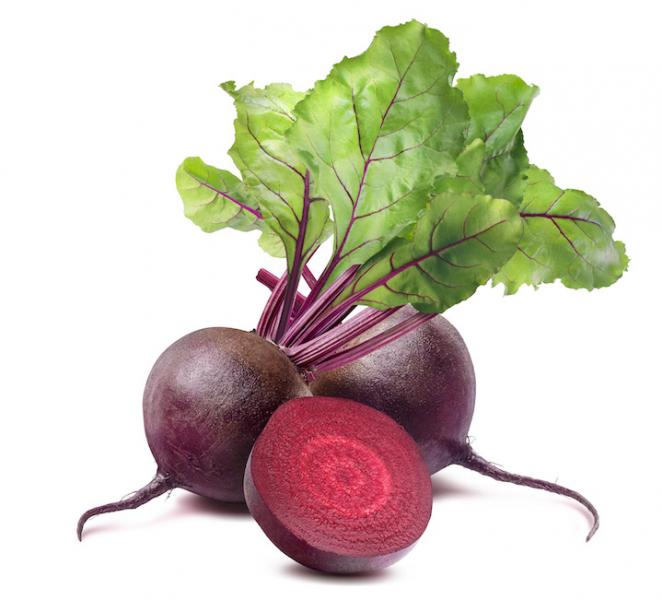 Another way the body makes NO is from nitrate (NO3) and nitrite (NO2). Nitrates are naturally found in many common vegetables, including lettuce, arugula, spinach, parsley, cabbage, and turnips. Beets, however, are one of the best sources.
Another way the body makes NO is from nitrate (NO3) and nitrite (NO2). Nitrates are naturally found in many common vegetables, including lettuce, arugula, spinach, parsley, cabbage, and turnips. Beets, however, are one of the best sources.
Dietary nitrates are absorbed in the stomach and intestines. They are carried through the bloodstream to the salivary glands, which extract the nitrates and concentrate them in the salvia. Bacteria in the mouth convert the nitrates to nitrite, which is swallowed and converted into NO under the influence of hydrochloric acid.
Nitrites produce NO without oxygen, which means they can help enhance NO when oxygen levels are low. This is important because as we age, oxygen levels in tissues tend to fall. Oxygen levels are also low in many chronic diseases.
At one-time people were concerned about the safety of nitrates because of their use as preservatives in processed meats. It turns out that natural nitrates and nitrites aren’t harmful to human health, instead, they are important phytonutrients.
NO Enhancing Formulas
There are a number of supplements you can take to enhance NO that combine l-arginine with beet concentrate or other sources of nitrates. These supplements may also contain nutrients that protect the endothelial lining, such as vitamin C, vitamin D3, and vitamin K2. Magnesium (which also helps lower blood pressure) and niacin can also be used in supplements to enhance NO production and improve circulation.
I regularly use one of these supplements, which helps me have less fatigue after exercise and I believe it is helping me maintain healthy blood pressure levels as I grow older. If you have high blood pressure, find it difficult to exercise, have chronic inflammation in your system, or are over 60 and simply want to maintain healthy circulation you may wish to try some NO enhancing supplements, too.
Steven's Articles
-

-
Eucommia Bark
A superior tonic that promotes kidney, structural,…
January
-

-
Goldenthread, Phellodendron, and Yellow Root
Three herbal remedies containing the infection-fighting…
-

-
Teasel
A traditional herb for healing bones and joints…
-

-
Barberry and Healthy Personal Boundaries
A thorny shrub for fighting infections and supporting…
December
-

-
The Evidence for Berberine
A yellow alkaloid found in traditional infection-fighting…
-

-
The Sensible Use of Caffeinated Herbs
Kola nuts, guarana, and yerba mate and other herbs…
-

-
The Health Benefits and Problems with Coffee
This popular caffeinated beverage can be beneficial…
October
-

-
Understanding Caffeine & Cellular Adaptation
Preserving the power of caffeine's buzz and the…
September
-

-
Horseradish
A pungent spice for aiding protein metabolism…
-

-
Banaba or Crepe Myrtle
A beautiful tree from Southeast Asia whose leaves…
August
-

-
Monkeyflowers
Flower essences to help see ourselves more clearly…
-

-
Mariposa Lilies
Strengthening the bond between mother and child…
-

-
The Noble Bay Leaf
A common kitchen herb for aiding digestion and…
-

-
Epimedium: Horny Goat Weed
A circulatory stimulant and kidney yang tonic…
July
-

-
The Medicinal and Nutritional Benefits of Apricots
A nutritious fruit and valuable medicinal seed for coughs

